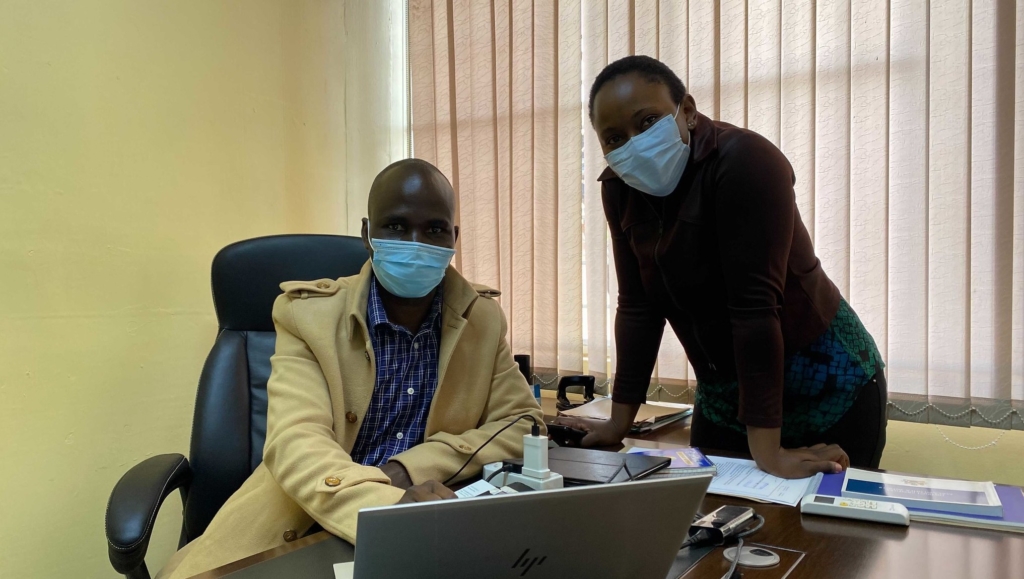By Tasokwa Nkhonjera, Senior Manager, Digital Health, Last Mile Health Malawi
It is a sunny morning in Lilongwe, Malawi as Lisa Jere stands in a queue with a baby strapped at her back. Lisa is one of the few mothers in her village who sees the importance of attending outreach immunization clinics even though the barriers to accessing the services are many. Her biggest worry, which has been demotivating to other mothers, is that it takes many hours to be attended to.
“I have been here since 8.00 a.m but I have to wait a little more. I know the [Health Surveillance Assistant] is doing her best, but I wish there was a way here at the clinic to do the processes quickly,” she says.
Beatrice Banda, her community health worker, known locally as a Health Surveillance Assistant, is also looking forward to the day when immunizations could be done more quickly and efficiently.
“Collecting comprehensive information on a paper-based system is cumbersome. There is so much information to be collected while ensuring that we are providing the clients with the best care in a timely manner,” she says.
Using paper forms, Beatrice collects the same demographic information about the client at every visit. At the end of the month, she spends about 10 hours aggregating that month’s information and compiling reports.
Beatrice shares a number of other challenges with the paper-based forms: that the information often does not reach decision-makers, and that it does not give a comprehensive picture of the challenges at the community level. “For instance, I constantly run out of drugs at my clinic because I am getting very limited stock. Over the years my catchment population has increased and I am still getting the same drug allocation which is not enough to serve my population.”
Sometimes, Beatrice says, it is difficult to follow up on previous agreed action points because the papers get lost, meaning there is no progress made when she is supervised. It’s the same thing over and over again.
Information collected using central health record platforms, such as the health management information system, captures only a small proportion of the health needs within the community, since it only includes information from clients who are able to visit the health facilities.
“The information in the [health management information system] doesn’t capture or monitor an illness that is [perceived] too mild to be reported and some diseases that can easily lead to stigmatization for instance STIs, leprosy and epilepsy,” she says.
Improving and digitizing community health information systems is essential for addressing the health challenges faced by rural communities in Malawi. His Excellency Dr. Lazarus McCarthy Chakwera, President of the Republic of Malawi, underscored this in his May 12, 2021 State of the Nation Address:
Madam Speaker, in my first State of the Nation Address, I committed my Administration to the goal of ensuring that there is a health service every 5 km radius. For this to happen, we intend to pursue the ambition I set last year to construct 900 Health Posts and staff accommodation in hard-to-reach areas by the year 2022. In the meantime, at community level, we will continue promoting and strengthening the use of digital health through an integrated Community Health Information System that promises to transform community health care delivery and harmonize all community health data.
The integrated Community Health Information System (iCHIS) is a digital system that combines software, hardware, people, and processes to support informed decision making and action taken by community health workers. iCHIS is being developed by the Government of Malawi, with technical assistance from the Department of Computer Science at the University of Malawi, and is being supported by various implementing partners like Last Mile Health and UNICEF. Users record basic data, such as population health and resource availability, track cases, and take action to address individual program needs. The system is still being developed with the hopes that initial roll out will begin in March 2022. The iCHIS will offer a more complete picture of health challenges faced by communities and provide real-time data to community health workers, clinicians, and policy-makers to inform solutions for lasting change.
The new system will complement the existing health management information system, it will shift the focus from the health facility to the community level, and it will promote equity, empowerment, and efficiency in healthcare delivery.
If implemented across the country, iCHIS has the power to address many of the challenges caused or exacerbated by poor access to healthcare services, including limited health workers, out-of-reach reach health facilities, and high disease burden.
For Lisa and other caregivers in her community, iCHIS will mean better access to essential medicines and shorter wait times for immunizing their children. For Beatrice, it will mean greater efficiency, allowing her to improve and expand the health care services she provides each day. And it will mean that health leaders understand and can respond to the community’s needs in real-time.





